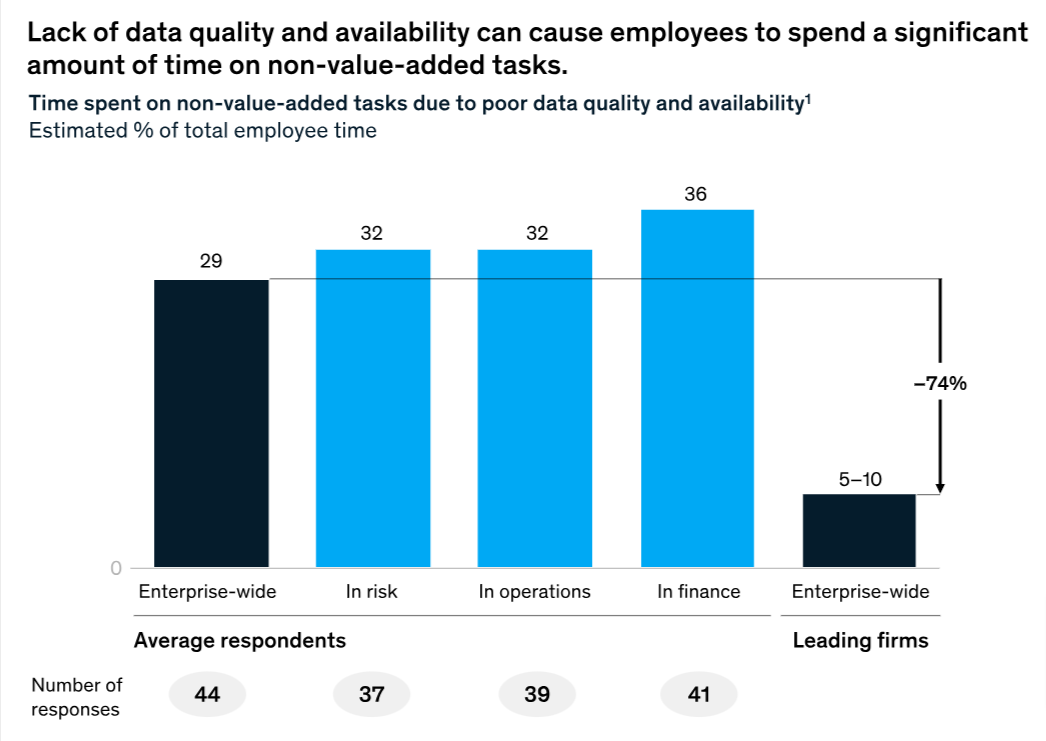Strengthening Investor Relations: Why Complete Data is a Critical Improvement
Published by Adaptive IR

TL;DR
Incomplete data can hinder decision-making and transparency, impacting investor relations successes. By investing in complete, accessible data and robust governance practices, companies empower executives and IR teams to make faster, more informed strategic decisions while delivering clearer, more reliable insights to all stakeholders. This critical improvement strengthens IR efforts and provides a competitive advantage in today’s dynamic markets.
How Complete, Accessible Data Accelerates Efficiencies Across the Enterprise
In today’s fast-paced business environment, enterprises need more than standard data sources. They require complete, accessible data that empowers executives, investor relations teams, and other key stakeholders to make informed decisions swiftly. Yet many companies face obstacles accessing accurate data needed to create consistent, actionable reports. Primary exchanges offer only partial insights, leaving organizations to contend with gaps in the information critical for robust decision-making.
For enterprises ready to overcome these challenges, investing in consistent, repeatable data practices is essential. With streamlined, high-quality data governance, organizations can improve strategic decision-making for internal teams while enhancing the clarity and depth of information available to investors.
Data That Powers Efficiency and Strategic Agility
In fast-moving markets, executives and IR teams must act quickly and decisively. Accessible, consistent data transforms decision-making by enabling leaders to respond proactively to market changes, assess risks accurately, and seize strategic opportunities sooner. When organizations invest in robust, standardized data practices, they unlock key efficiencies across critical areas:
- Accelerating High-Stakes Decisions for Executives – With more complete data, executives can quickly analyze trends, evaluate risks, and make informed decisions. This streamlined access to reliable information reduces the time spent sifting through fragmented reports, allowing leaders to focus on strategy and growth.
- Strengthening Market Position – Robust, accurate data equips IR teams to deliver insightful, timely reports that enhance the company’s reputation and credibility. With consistent access to performance indicators and market insights, IR professionals can offer deeper analysis that builds investor trust and underscores the company’s strategic vision.
- Achieving Cross-Functional Alignment and Efficiency – When data is standardized and accessible, departments across the enterprise benefit from a shared understanding of key metrics, creating alignment and reducing silos. This cohesion accelerates collaborative decision-making and ensures that teams work from a unified foundation of information, reducing cost of capital.
The Foundation: Data Governance for Accessibility and Consistency
The reliability and accessibility of data are only possible through robust governance strategy. Data governance provides the structure to ensure data is current, comprehensive, and easily accessible by those who need it most. By establishing strong governance practices, companies can bridge the gaps in data coverage that slow reporting and decision-making. McKinsey & Co. (2020)1 highlights that organizations with mature data governance strategies see significantly improved efficiencies by reducing time spent on data preparation and enhancing the quality of insights available for strategic decision-making. These mature systems avoid the common inefficiencies caused by fragmented or inaccessible data, enabling smoother and faster reporting.

Source: McKinsey Digital
Enhanced Reporting for External Stakeholders
While the primary advantage of accessible, standardized data lies in accelerating internal efficiencies, the benefits extend outward. For IR teams, high-quality data supports clearer, more transparent communication with external stakeholders. Robust data processes mean IR teams can confidently deliver insights to investors that reflect the company’s performance and strategic direction without relying on manual processes.
- Building Confidence with Transparent Reporting – Accurate, structured data equips IR teams to deliver detailed reports that answer investor questions and provide actionable insights, fostering trust and transparency.
- Agility in Addressing Market Dynamics – Reliable data allows IR teams to stay agile, responding quickly to market events or investor inquiries with accurate, relevant information.
- Meeting Evolving Investor Expectations – In a data-rich world, investors expect more than basic metrics. By maintaining high data standards, companies meet these expectations, giving investors a comprehensive view of company performance that goes beyond conventional reporting.
Turning Data into a Competitive Advantage
When robust, accessible data is integrated into daily operations, it becomes more than a tool for decision-making—it’s a competitive advantage. With high-quality data, companies empower executives and IR teams to make decisions with greater speed and confidence, driving efficiency across the enterprise. At the same time, they provide investors with the transparency and insights needed to see the company’s value clearly.
For organizations ready to harness the power of accessible data, the path is clear: investing in standardized data practices and robust governance will unlock efficiencies that benefit both internal decision-makers and external stakeholders. The result is a streamlined, agile organization capable of navigating complex markets with ease.
What’s Next?
Discover how Adaptive IR’s full-market data insights can provide your company with the clarity needed to make informed decisions in today’s fragmented market. Contact [email protected] for more information.
1. Designing data governance that delivers value, McKinsey & Co